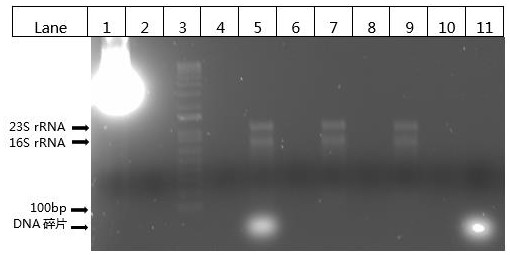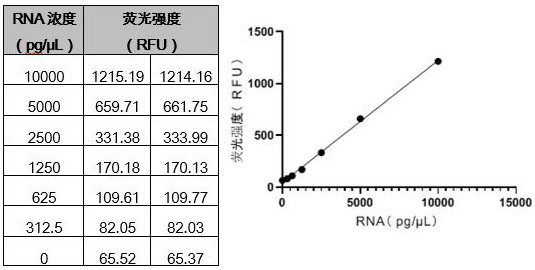A general and rapid method for the quantification of rna residues in dna products
A technology for residues and products, applied in measuring devices, material inspection products, material analysis through optical means, etc., can solve the problems of interfering RNA band detection, complicated experimental procedures, and reducing the sensitivity and accuracy of AGE method, etc. Achieve the effect of low cost, simple experimental process and good accuracy
- Summary
- Abstract
- Description
- Claims
- Application Information
AI Technical Summary
Problems solved by technology
Method used
Image
Examples
Embodiment 1
[0033] 1. Preferred specific nucleases
[0034] The interference of DNase I (Thermo Scientific, EN0523) in combination with RNase Inhibitor (Promega, N2611) and RNase A (Thermo Scientific, EN0531) alone on the fluorescence signal of the RNA-specific nucleic acid dye Qubit RNA HS (Invitrogen, Q32852) was compared.
[0035] Prepare the following solutions as needed:
[0036] 1) DNase I Mix: 3.2µL DNase I, 16µL 10X Reaction Buffer with MgCl 2 , 0.8µL RNase Inhibitors, 60µL H 2 O (Nuclease-Free)
[0037] 2) RNase A Mix: 490TE Buffer+10µL RNase A
[0038] 3) TE Buffer (RI): 99µLTEBuffer, 1µLRNase Inhibitor
[0039] 4) QubitWorking Solution: 3µL QubitRNAHSReagent, 597µL QubitRNAHSBuffer
[0040] Prepare the experimental group:
[0041] 1) Blank group: 20µLTE buffer
[0042] 2) DNase Mix group: 10µLTE buffer (RI), 10µLDNase I Mix (DNase I final concentration 1U / µL)
[0043] 3) RNase Mix group: 10µLTE buffer, 10µL RNase AMix (final RNase concentration 0.1µg / µL)
[0044] Digest ...
PUM
 Login to view more
Login to view more Abstract
Description
Claims
Application Information
 Login to view more
Login to view more - R&D Engineer
- R&D Manager
- IP Professional
- Industry Leading Data Capabilities
- Powerful AI technology
- Patent DNA Extraction
Browse by: Latest US Patents, China's latest patents, Technical Efficacy Thesaurus, Application Domain, Technology Topic.
© 2024 PatSnap. All rights reserved.Legal|Privacy policy|Modern Slavery Act Transparency Statement|Sitemap



